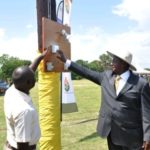
Uganda is set to borrow US70.73 million from the Islamic Development Bank (IDB) for the implementation of the Grid Rural Electrification Project, in a bid to improve rural electricity connections.
According to a June 25 release signed by Information and National Guidance Minister Maj Gen Jim Muhwezi, Cabinet has directed the Ministry of Finance and Economic Planning to seek parliamentary approval for the funds, that will help ameliorate power needs and enhance electricity connections to over the current 20 per cent in the rural areas.
“It (project) will provide sufficient power transfers from the existing hydro-electric power stations to meet the growing electricity demand. It will also reduce transmission losses by improving system efficiency, stability and reliability,” the release states in part.
According to Muhwezi, the project will enable 15,807 new consumers in rural Uganda access electricity by 2022.
Previously, a ten-year programme, the Rural Electrification Strategy and Plan (2001-2010), aimed at increasing access to electricity in rural areas from one to 10 per cent by 2010.
“It will also enhance Uganda’s on-going industrial development by providing stable electricity in all regions of the country,” the Minister observed.
Meanwhile, the development of skills in the country might receive a shot in the arm after Cabinet approved the borrowing of US$100 million from the International Development Association, (IDA), to enhance the skills’ programmes.
According to a June 25 release signed by information minister Maj Gen Jim Muhwezi, the money will be used for both institute and enterprise-based training, with the former carried out under Business, Technical and Vocational Education Training to involve public and private training institutions, while enterprise-based training will cover the informal sector to improve appropriate skills development including ‘craftsmanship, enhancement of local innovations and technologies, agri-business value addition, electrical /cottage and garment production skills with emphasis on quality assurance required by the market’.
In April this year, the World Bank approved the equivalent of US$100m for the Uganda Skills Development Project, ‘to boost government institutions to provide high quality, demand-driven training programmes in key areas such as agriculture, construction and manufacturing’.







